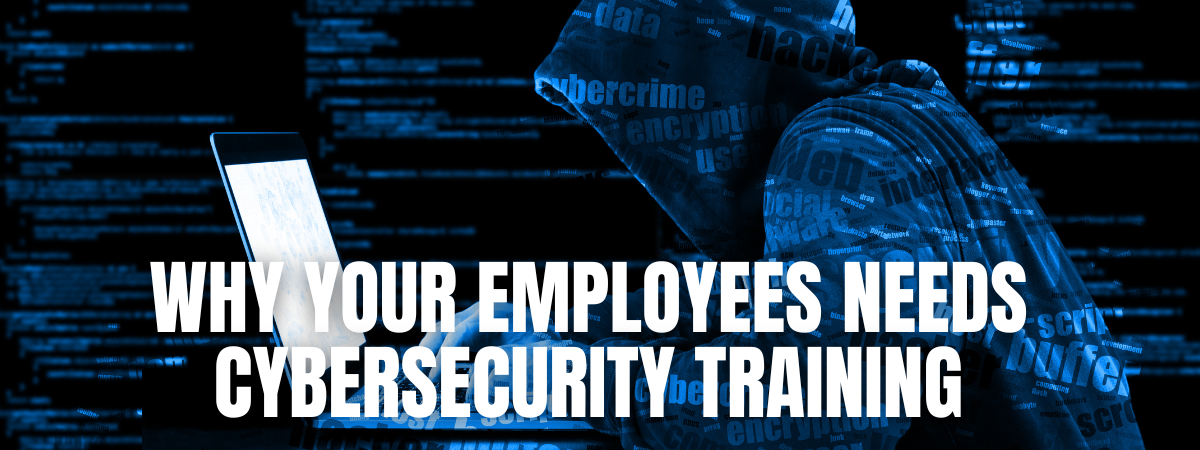
Why you need employee cybersecurity training for your business.
In this digital age, characterized by ever-evolving cyber threats of increasing sophistication, investing in comprehensive employee cybersecurity training is not just beneficial but essential for safeguarding your business and its assets. As technology advances, so do the methods employed by cybercriminals to exploit vulnerabilities within organizations.
Without adequate training, employees may unwittingly fall prey to phishing scams, malware attacks, or other malicious activities, inadvertently compromising sensitive data and putting the entire company at risk. By prioritizing cybersecurity education, businesses can empower their workforce to recognize potential threats, adopt best practices for data protection, and respond effectively to security incidents, thereby fortifying the company’s defense against cyber threats.
Moreover, employee cybersecurity training fosters a culture of vigilance and accountability within the organization. Your business should make sure that employees understand the importance of cybersecurity and what their individual role is in maintaining it. This way they become active participants in the defense against cyber threats rather than passive bystanders. Plus, having this heightened awareness translates into proactive measures such as regularly updating software, implementing strong passwords, and adhering to security protocols, which collectively contribute to strengthening the posture of your organizations cybersecurity.
Additionally, by investing in the continuous education of employees, businesses demonstrate their commitment to prioritizing security and resilience in the face of new cyber threats, instilling confidence among clients in the company’s ability to protect sensitive information and preserve business continuity.
Cybersecurity training for employees is essential for several reasons:
- Reduced Risk of Data Breaches: Employees trained in cybersecurity are less likely to fall prey to cyber-attacks, significantly minimizing the risk of data breaches.
- Empowered Employees: Training gives employees the confidence and knowledge to take charge of their digital safety.
- Compliance with Regulations: Cybersecurity training helps ensure your business follows data protection laws and regulations.
- Cost Savings: By preventing cyber attacks, businesses can save on the costs associated with data breaches, which can be substantial.
- Mitigation of Cyber Risks: Educated employees can better identify and mitigate potential cyber risks.
- Enhanced Reputation: A company that takes cybersecurity seriously can strengthen its reputation and build client trust.
- Increased Security Awareness: A well-trained workforce is more aware of security issues and better prepared to respond to them.
- Improved Compliance: Regular training ensures that employees are up-to-date with the latest compliance requirements.
- Reduced Liability: In a breach, well-trained staff can demonstrate due diligence and potentially reduce liability.
- Better Incident Response: Employees trained in cybersecurity can respond more effectively to incidents, minimizing damage and downtime.
Different Types of Cyber Security Training for Staff
Several types of cybersecurity training are tailored to the needs of your organizations staff:
- Cybersecurity Awareness Training: This basic training focuses on raising employee awareness about potential threats and best practices for digital safety.
- Specialized Cybersecurity Programs: More advanced programs covering in-depth technical aspects of cybersecurity are available for IT teams and roles such as security analysts.
- Compliance Security Training: This training ensures that employees understand and follow relevant laws and regulations regarding data protection and privacy.
- Technical Training: Employees receive in-depth knowledge about specific technical topics related to cybersecurity, helping them understand the technical side of security threats and defenses.
- Simulation Training: This involves simulating cyber attacks to give employees hands-on experience identifying and responding to security incidents.
- Classroom Training: Traditional in-person training sessions can be customized to cover various cybersecurity topics.
- Cloud Training: Employees can access online training modules remotely, which is especially useful for distributed teams.
- Video Training: Pre-recorded videos that provide visual and auditory learning about cybersecurity concepts and scenarios.
Each type of training has its benefits and can be used independently or in combination to create a comprehensive cybersecurity training program for your employees. Assessing your organization’s and employees’ needs is vital to determine the most effective training approach.
Internet Security Training for Employees
Internet Security Training for employees is crucial to safeguard your organization from cyber threats. Here are some key components your employees should learn about.
- Phishing Awareness: Employees learn to identify and avoid phishing emails, a common attack vector.
- Password Management: Training on creating strong, secure passwords and the importance of not reusing them across different services.
- Reporting Protocols: Clear instructions on how and when to report security incidents or breaches.
- Workstation Security: Best practices for securing workstations, including locking screens when away and managing sensitive information.
Choosing the right type of training that fits your organization’s needs is essential and ensures that all employees know how to protect themselves and the company from cyber threats.
Staff Data Security Awareness Training
Staff data security awareness training is vital for protecting your company’s sensitive information. Here’s how you can create an effective cybersecurity employee training program:
- Identify Training Topics: Focus on risks that employees face, such as phishing, malware, and secure password use.
- Develop Training Material: Use engaging formats like videos and interactive content to ensure better retention.
- Schedule Training Sessions: Implement regular training sessions, including annual refresher courses, to keep the knowledge up-to-date.
- Measure Effectiveness: To assess the impact of the training, surveys will be used to track the number of reported cybersecurity incidents.
- Use Available Resources: Consider vendors offering comprehensive courses on essential data security awareness topics.
- Customize Training: Tailor the training to your company’s specific needs and the types of data your employees handle.
- Mandatory for New Hires: Ensure all new hires undergo data security training to understand company policies and procedures.
- Continuous Learning: Foster a culture of constant learning and improvement in data security practices.
By following these steps, you can create a robust data security awareness training program that will help safeguard your company against cyber threats. Remember, the goal is to turn employees into advocates for data protection, recognizing it as both a legal obligation and an ethical imperative.
Staff Cyber Security Awareness Training
Staff cyber security awareness training is critical in safeguarding an organization’s information systems and data. Here are some key aspects of practical cyber security awareness training for staff.
- Understanding Cyber Threats: Employees should be educated about the numerous types of cyber threats, such as phishing, malware, ransomware, and social engineering attacks.
- Best Practices for Security: Training should cover best practices for password management, email security, and safe internet browsing.
- Recognizing Suspicious Activity: Staff should learn to recognize signs of suspicious activity and understand the importance of reporting it immediately.
- Data Protection Policies: Awareness of the organization’s data protection policies and procedures is crucial for compliance and security.
- Incident Response: Employees should be trained extensively on the steps to take if they suspect a security breach, including who to contact and how to contain the threat.
- Regular Updates: Cybersecurity threats constantly evolve, so regular updates and refresher courses are necessary to keep staff informed about the latest threats and defense mechanisms.
- Interactive Training: Interactive elements such as quizzes, games, and simulations can make training more engaging and effective.
- Customized Content: Tailoring the training content to the specific needs and roles of different departments within the organization can make it more relevant and valuable.
Microsoft Security offers a range of cybersecurity awareness resources and training curated by security experts to empower everyone in an organization to become a cybersecurity champion. Additionally, free and paid online courses cover a wide range of potential vulnerabilities and best practices to ensure your business is fully secure.
How Often Should Employees Receive Cybersecurity Training?
Employees should receive cybersecurity training regularly to maintain high-security awareness and threat detection capabilities. It’s also beneficial to start training during the new employee onboarding process to set the right expectations and knowledge base from the beginning. This is an ongoing program, where videos come out every week that your employee can watch and learn. And, at only 15 minutes, these quick refreshers will keep your employees on their toes.
Having a regular refresher can help employees retain crucial information and stay vigilant against threats like phishing emails, which can become less effective after six months without updates. Making cybersecurity training a mandatory part of an annual requirement for all employees is considered a best practice.
This is essential to create a security culture within the business where every employee understands their role in protecting sensitive company information and is equipped with the knowledge to do so effectively.
Don’t want to tackle employee cyber training on your own? If you have any questions training or would like to know more about System Protection Partners Cybersecurity Training services for your business please contact System Protection Partners today! We are your global IT team.


